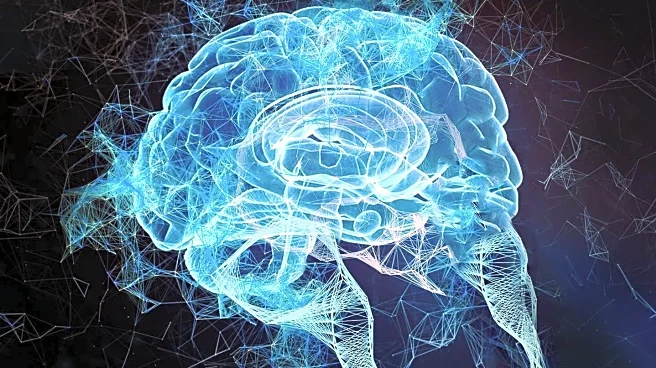What is the story about?
What's Happening?
Recent research suggests that the human brain operates near a critical point between order and disorder, a concept known as the critical brain hypothesis. This idea posits that the brain's electrical activity follows patterns similar to those seen in natural phenomena like avalanches and forest fires. Researchers, including Keith Hengen from Washington University in St Louis, argue that this 'edge of chaos' allows for the brain's extraordinary efficiency and flexibility. Studies have shown that the brain's proximity to this critical point can influence cognitive functions such as intelligence and creativity. The hypothesis also offers insights into brain dysfunctions, potentially aiding in the diagnosis of conditions like Alzheimer's disease.
Why It's Important?
Understanding the critical brain hypothesis could revolutionize neuroscience by providing a framework for explaining complex brain functions and disorders. It suggests that the brain's ability to process information and adapt to new situations is enhanced when operating near this critical point. This has implications for improving cognitive function and creativity, as well as understanding and treating neurological disorders. The hypothesis could lead to new approaches in mental health treatment, offering potential benefits for individuals with cognitive impairments or mental health conditions.
What's Next?
Future research may focus on how to manipulate the brain's position within the critical zone to enhance cognitive abilities or treat disorders. Techniques such as meditation or neurofeedback could be explored to shift the brain's activity towards or away from the critical point. Additionally, further studies may investigate the role of sleep in maintaining brain criticality, potentially leading to new insights into sleep disorders and their treatment.
Beyond the Headlines
The critical brain hypothesis challenges traditional views of brain function, suggesting that a degree of chaos is essential for optimal mental performance. This perspective may influence how we approach education, creativity, and mental health, emphasizing the importance of flexibility and adaptability in cognitive processes. It also raises ethical considerations regarding the manipulation of brain activity for enhanced performance or treatment.

















